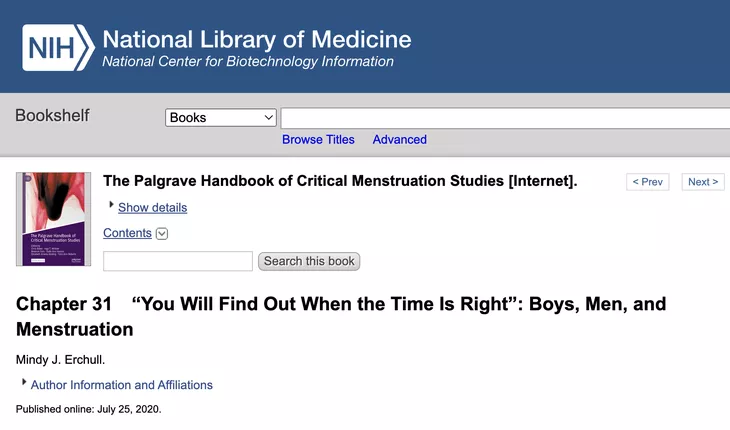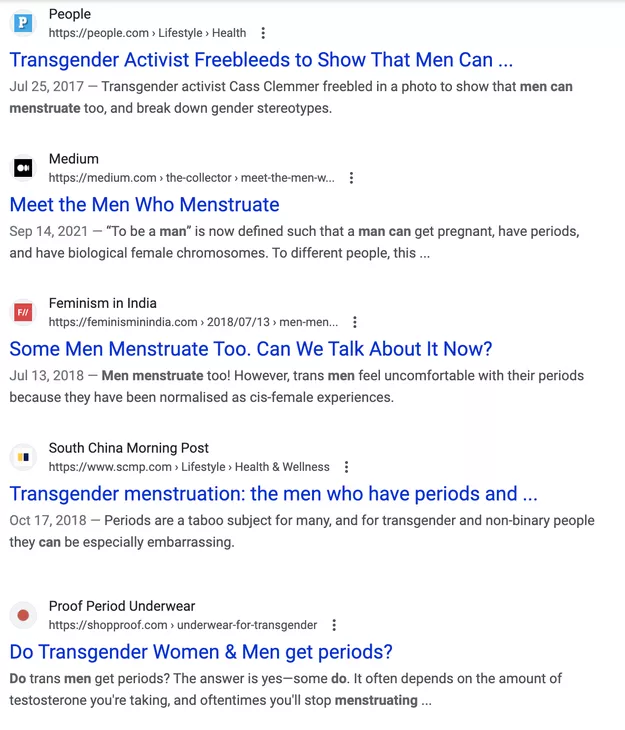Top News
Google this: “can men menstruate?”

Over the weekend I saw James Woods tweet an image from a Google search of the question “Can men Menstruate?”
On top of the list of results was a summary response that says, basically, “Yes, men can.” I thought the image was possibly a Photoshop so I tried it myself and got this:
That is the first response, after which you get a series of links to similar sites almost all with the same message.
For instance, the second link is to the National Institutes of Health making the same claim, giving it the imprimatur of authority.

While the actual text is not an official publication of the NIH (I think), it is an excerpt from “The Palgrave Handbook of Critical Menstruation Studies.”
Yes, there is apparently a handbook of Critical Menstruation Studies. Marxist ideology and how it impacts our understanding of bodily functions. I assume that this is a kind of Lysenkoism updated for the modern world.

Not having a time machine, I can only speculate but it seems likely that only a few years ago the Google search would have returned a rather different set of links, none of which would have been promoting an ideological assertion but rather a more responsive set leading you to biology papers.

One of the most striking things about the list other than its ideological uniformity is its utter disregard for biology–and by this, I am not referring to the idiocy of arguing men can menstruate. There is very little information on what exactly menstruation is and why it only occurs in one of the two biological sexes.
The ideology, in other words, requires an almost complete abstraction from the bodies of the people to which we are referring.
This is core to the alphabet ideology, in which there is a necessary separation of mind and body. In this sense, transgender ideology is merely a subset of transhumanist ideology. You probably got your first whiff of transhumanism (at least I did) in the utopian literature in which human beings upload themselves into a virtual reality. This is a common theme in some science fiction and promises a sort of immortality and absolute freedom.
Looked at in this context you can probably see the attraction of transhumanism and its subset transgenderism. It promises a kind of liberation–one which is very appealing to many people. Anybody who suffers from the inevitable indignities of being embodied and aging can sense the attraction of this kind of liberation. As a late-middle-aged guy, I experience normal aches and pains, chronic pain from heart surgery, and the twinges that remain from a long-ago broken ankle.
Transhumanism’s promise of liberation is rooted in a basic falsehood: human beings are embodied, and our self cannot be separated from our bodies. You can see that most obviously in the twisted results of “gender-affirming care,” in which scalpels, hormones, constant care, and likely shortened lives with near-constant pain are the reality. “Trans-women” who have been surgically altered live with a permanent wound for the rest of their lives, and children treated with puberty blockers will never experience sexual satisfaction.
Transhumanism’s promises are false, but they are understandable once you see the underlying attraction. And most people drawn in are victims just as much as any cult member is.
Unfortunately, as you can see from the results of the Google search, it is also becoming the prevailing religion in America as Christianity has lost its dominance. Most atheists argued that science and rationalism would replace Christianity as its influence waned, but experience shows that ideologies and fake “spirituality” fill the hole that once was occupied by God.
I won’t try to convince others that Christianity is the one true faith–I am a poor evangelist and a very fallen man–but I am certainly obligated to fight against the deceptions that are ruining the lives of countless people.
Relatively few people are drawn to evil for its own sake; it is the false promises of happiness, ultimate freedom, and eventually immorality that draw people to their doom.
Google’s motto used to be “Don’t be evil.” You can see why they decided to drop it.
Read the full article here


















